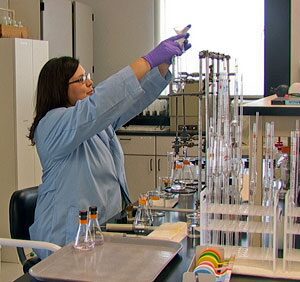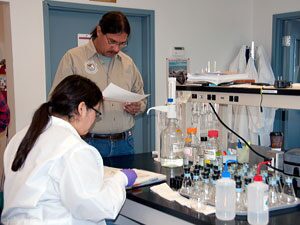
Water is life Dedicated to preserving this unique ecosystem
Pyramid Lake Fisheries has a dedicated water team, with an advanced water laboratory.


Water Quality Laboratory
Located next to the Fisheries Administration building in Sutcliffe, the water quality laboratory was constructed in 2002 to facilitate testing and analysis of surface water samples gathered from the reservation and water quality and fish health monitoring in the Tribe’s trout and Cui-ui hatcheries. The lab is equipped to analyze for total ammonia, nitrate/nitrite, total Kjeldahl nitrogen, total phosphate, and orthophosphate. Measurements of physical parameters include temperature, dissolved oxygen, pH, salinity, and conductivity.
Nitrogen and phosphorus are important parameters to monitor because they are the nutrients needed for primary production (e.g., algal growth), which drives the entire food chain. In the hatcheries, nitrogen (ammonia and nitrite) can rise to toxic levels because approximately 80% of the water in the hatchery is recycled, and the biological filters cannot remove all the fish waste products.
The lab uses EPA-approved analytical procedures for all environmental samples. Standard operating procedures include test descriptions, equipment, calibration requirements, and analytical procedures. An extensive quality control program is designed to ensure data integrity, precision, and accuracy.
The fish health lab tests fish for common diseases before they can be planted in the Lake or River. Samples of gill, liver, kidney, and spleen are routinely tested for diseases such as furunculosis, bacterial kidney disease, bacterial gill disease, infectious hepatic necrosis, viral hemorrhagic septicemia, and infectious pancreatic necrosis.
The most common equipment used in the laboratory includes reverse osmosis, and distillation and deionization units for making reagent-grade water; analytical scales; fume hoods; block digestors; water baths; spectrophotometers; pH and dissolved oxygen meters; nitrate reduction columns; autoclave; and bacterial incubators. A variety of reagent-grade chemicals are used in the analytical process, and lab waste is disposed of according to federal and local regulations.
